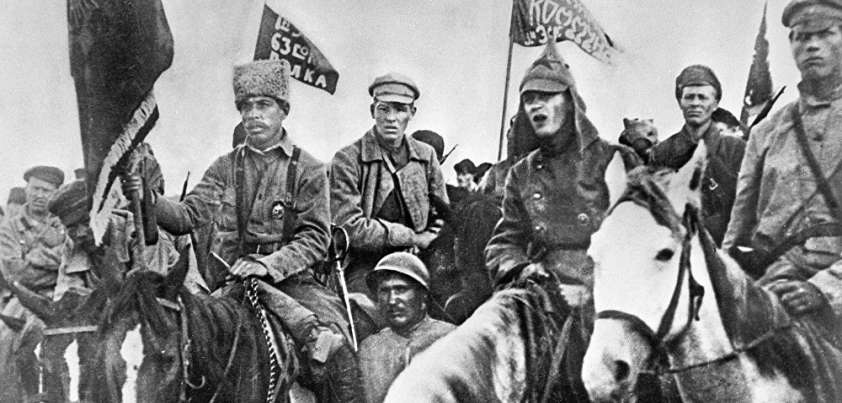 Today we have three stories (Crossing the Zbrucz, My First Goose and Salt) from Red Cavalry, a collection of edited entries from the war diary of Russian author Isaac Babel. The stories reflect his time as a journalist / propagandist attached to the First Cavalry unit of the Red Army during the Polish-Soviet War of 1920. These are not typical war stories involving great battles and inspiring heroes. Instead, the book provides a graphic insight into the human impact of the war on those fighting it, as well as the casualties and brutalities inflicted by both sides on innocent civilians.
Today we have three stories (Crossing the Zbrucz, My First Goose and Salt) from Red Cavalry, a collection of edited entries from the war diary of Russian author Isaac Babel. The stories reflect his time as a journalist / propagandist attached to the First Cavalry unit of the Red Army during the Polish-Soviet War of 1920. These are not typical war stories involving great battles and inspiring heroes. Instead, the book provides a graphic insight into the human impact of the war on those fighting it, as well as the casualties and brutalities inflicted by both sides on innocent civilians.
Crossing the Zbeucz Original Text / PDF (632 words)
My First Goose Original Text / PDF (1,264 words)
Salt Original Text / PDF (1,264 words)
General Comments
Our source for these stories is a 2014 translation of the book by Boris Dralyuk, published by Pushkin Press, London. As with all non-English writings, versions from other translators may result in slight differences in interpretation and/or wording.
In addition to the general horrors of war, a second recurring theme in the book is Antisemitism. Although the majority of the region’s population were Christian, its artisan and merchant classes were predominantly Jewish. There were several pogroms against Jews in the lead-up to the war, and during the conflict soldiers on both sides were particularly vicious towards Jewish civilians. This placed the narrator, who also happens to be a Jew, in a difficult position. He gets around this by being selective in when to admit to his religion.
Another important theme is the slide from innocence to corruption and brutality. The intellectual narrator must not only suppress his religious and intellectual ideals, but on occasion also mirror the barbaric behavior of his fellow soldiers in order to survive.
Throughout the book, the narrator refers to the men of the First Cavalry as “Cossacks”. To many Westerners, the term Cossack is associated with the famed horseback warriors of the Russian Steppes who held back the Mongol and Tartar hordes. However, by the time of this story the term had broadened and referred to a Christian ethnic group that found itself on both sides of the Polish-Soviet War. These were not experienced soldiers. Most of the Cossacks in the Red Army were illiterate peasants and factory workers. The Red Cavalry co-opted almost any of them who could ride a horse.
About the Stories
Crossing the Zbeucz
This is the first story in the book. The First Cavalry has just stormed across the Zbeucz River into what was then Eastern Poland. A poetic description of the countryside contains some vivid foreshadowing of what is to come: An orange sun rolls across the sky like a severed head… Coincidentally, the narrator is assigned to sleep in a Jewish household. He is revolted by its filthy condition and, rather than sympathize with the plight of the occupants, angrily demands that they clean up the mess. He then dehumanizes the two men that do so by comparing them to monkeys.
My First Goose
Here the narrator (a bookish, bespectacled lawyer) reports for duty in a new staff position. On the way to his billet with five hardened Cossacks, the quartermaster gives him some advice: We’ve got trouble with glasses around here, and you can’t do a thing about it. A man of the highest distinction — he’s a goner for sure. But you ruin a lady, the nicest little lady, and our fighting boys treat you real kind. As predicted, the Cossacks ridicule him from the moment he arrives. This prompts him to follow the quartermaster’s advice, although perhaps not in the way intended.
Salt
Profiteers selling illegal goods delay a troop train. Some women among them arrange a ride to the front, knowing that the price they must pay is to be gang raped. An idealistic war correspondent allows a respectable-looking woman with a child onto the train and places her under his protection. She has told him she is taking the baby to find her husband. In reality, there is no baby. She is smuggling salt. The politically indoctrinated journalist is so incensed when he learns the truth that he brutally murders her.